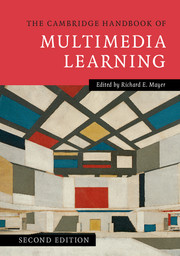Book contents
- The Cambridge Handbook of Multimedia Learning
- The Cambridge Handbook of Multimedia Learning
- Copyright page
- Contents
- Contributors
- Preface
- Acknowledgments
- 1 Introduction to Multimedia Learning
- Part I Theoretical Foundations
- Part II Basic Principles of Multimedia Learning
- Part III Advanced Principles of Multimedia Learning
- 15 The Guided Discovery Learning Principle in Multimedia Learning
- 16 The Worked Examples Principle in Multimedia Learning
- 17 The Self-Explanation Principle in Multimedia Learning
- 18 The Generative Drawing Principle in Multimedia Learning
- 19 The Feedback Principle in Multimedia Learning
- 20 The Multiple Representation Principle in Multimedia Learning
- 21 The Learner Control Principle in Multimedia Learning
- 22 Animation Principles in Multimedia Learning
- 23 The Collaboration Principle in Multimedia Learning
- 24 The Expertise Reversal Principle in Multimedia Learning
- 25 The Individual Differences in Working Memory Capacity Principle in Multimedia Learning
- Part IV Multimedia Learning of Cognitive Processes
- Part V Multimedia Learning in Advanced Computer-Based Contexts
- Author Index
- Subject Index
21 - The Learner Control Principle in Multimedia Learning
from Part III - Advanced Principles of Multimedia Learning
Published online by Cambridge University Press: 05 August 2014
- The Cambridge Handbook of Multimedia Learning
- The Cambridge Handbook of Multimedia Learning
- Copyright page
- Contents
- Contributors
- Preface
- Acknowledgments
- 1 Introduction to Multimedia Learning
- Part I Theoretical Foundations
- Part II Basic Principles of Multimedia Learning
- Part III Advanced Principles of Multimedia Learning
- 15 The Guided Discovery Learning Principle in Multimedia Learning
- 16 The Worked Examples Principle in Multimedia Learning
- 17 The Self-Explanation Principle in Multimedia Learning
- 18 The Generative Drawing Principle in Multimedia Learning
- 19 The Feedback Principle in Multimedia Learning
- 20 The Multiple Representation Principle in Multimedia Learning
- 21 The Learner Control Principle in Multimedia Learning
- 22 Animation Principles in Multimedia Learning
- 23 The Collaboration Principle in Multimedia Learning
- 24 The Expertise Reversal Principle in Multimedia Learning
- 25 The Individual Differences in Working Memory Capacity Principle in Multimedia Learning
- Part IV Multimedia Learning of Cognitive Processes
- Part V Multimedia Learning in Advanced Computer-Based Contexts
- Author Index
- Subject Index
Summary
The learner control principle suggests that giving learners control over their instruction by allowing them to pace, sequence, and select information aids learning if learners possess high levels of prior knowledge and if they receive additional instructional support to orient themselves in the learning environment and to self-regulate their learning. The reasons for the potential effectiveness of learner control are manifold. In particular, learner control has been suggested to afford an active, constructive processing of instruction, to increase and sustain the motivation to learn, to enhance the acquisition of self-regulatory skills, and to enable learners to adapt instruction to their preferences and needs. Despite these envisioned benefits, there is little empirical evidence supporting these claims, which is largely because these benefits are overwritten by the additional cognitive and metacognitive demands learner control imposes. As a consequence, learners need to possess prior knowledge that helps them make good use of the options to pace, select, and sequence information. Moreover, instructional support is required that facilitates learners’ orientation and navigation in the learning environment as well as their self-regulation during learning. Implications for the formulation of a cognitive theory of hypermedia learning as well as for future research are discussed.
Keywords
- Type
- Chapter
- Information
- The Cambridge Handbook of Multimedia Learning , pp. 487 - 512Publisher: Cambridge University PressPrint publication year: 2014
- 27
- Cited by

